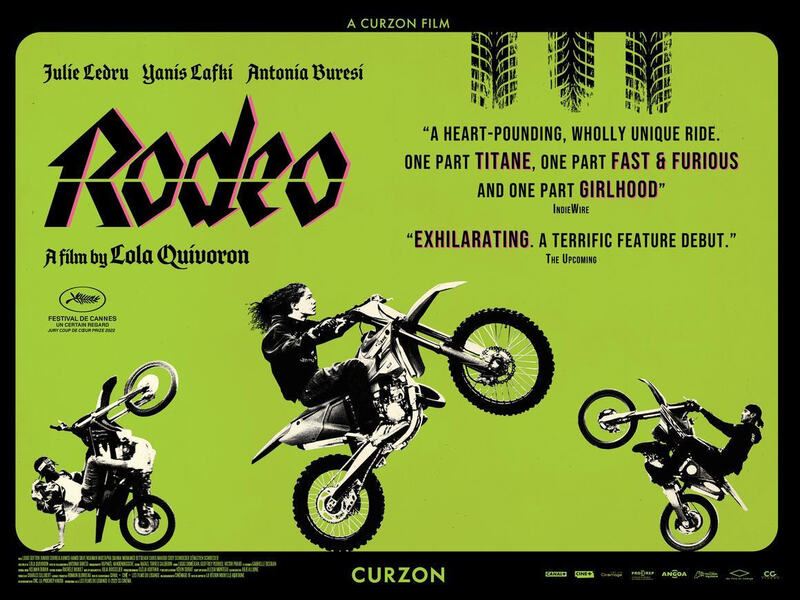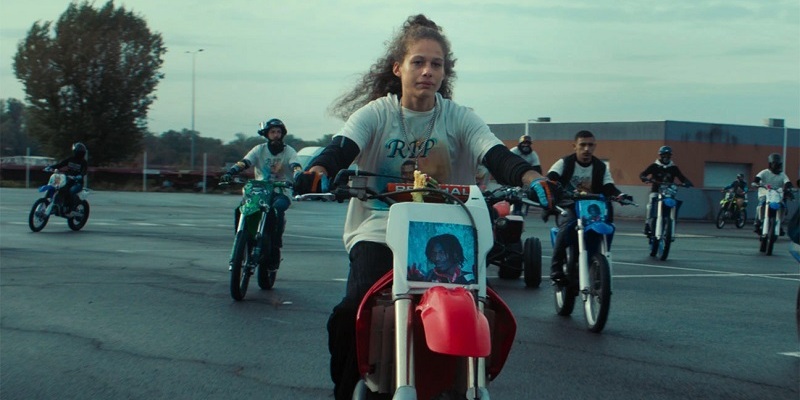
Review by
Eric Hillis
Directed by: Lola Quivoron
Starring: Julie Ledru, Yanis Lafki, Antonia Buresi, Louis Sotton, Junior Correia, Ahmed Hamdi, Dave Nsaman

American cinema of the 1950s was full of b-movies that catered to the first
generation of teenagers able to drive their own cars, or at least borrow
Daddy's on a Friday night. They usually involved juvenile delinquents
getting involved with hardened criminals through their love of speed, and
they would invariably fall for the big baddy's girlfriend. This simple
premise fuelled many a double feature at the drive-in and decades later was
rehashed to kick off the modern blockbuster franchise
The Fast and the Furious, which took its name from a 1954 b-movie produced by the King of the Bs,
Roger Corman.
Director Lola Quivoron's debut feature Rodeo is
very modern and very French, but like that first instalment of the
Fast and Furious series, it's essentially just a reworking of
a typical 1950s petrolhead programmer. The soundtrack is hip-hop rather than
rock 'n roll and the characters ride motorbikes rather than race
convertibles, but otherwise it ticks all the same boxes.

Our juvenile delinquent anti-heroine here is Julia. Played by
Julie Ledru, a real life biker discovered by the director, Julia
lives her life in both fast and furious fashion. She makes a living stealing
motorbikes by posing as a buyer on ebay and then disappearing in a cloud of
exhaust fumes when the seller is dumb enough to let her take their bike for
a test ride. Much of Rodeo strains credulity, but this ongoing
scam is the hardest element to swallow. Wouldn't word get out among the bike
enthusiast community that a distinctive young woman is stealing bikes on
such a regular basis?
Julia takes her latest stolen bike to an "urban rodeo," where young men
perform wheelies on a stretch of road. "Lads, you're in your twenties, get a
life," will probably be your reaction, and it was certainly mine. But
whatever gets you through the day I guess. Julia desperately wants to be
part of this male-dominated scene and gets to prove her worth when she
displays some medical skills (how she acquired them is never explained) to
settle a wounded biker's leg.

A bunch of bikers who call themselves the B-Mores take her back to the
lock-up where they store stolen bikes and introduce her via facetime to
their incarcerated boss, Domino (Sébastien Schroeder). Impressed by
her thievery skills, Domino recruits Julia to work for him. I couldn't wrap
my head around why Julia would split the profits of her crimes with someone
else rather than continue to keep them for herself, but I guess she's really
desperate to hang out with a bunch of lads and pull wheelies.
As I previously mentioned, the protagonists of these movies are always
falling for the villain's girl, and that's the case once again here.
Domino's wife Ophélie (Antonia Buresi, who co-wrote the script)
might as well be imprisoned herself, as he forbids her from leaving their
home unless it's for a conjugal prison visit. She even lives behind
shuttered windows, presumably to fend off attacks from Domino's
enemies. Ophélie is the most interesting character in the movie, and I
couldn't help but wish Quivoron had decided to make a movie about the
lonely life of a feared criminal's wife instead of this hackneyed high speed
heist thriller, something along the lines of Isabella Eklöf's excellent
Holiday. But Ophélie only pops up intermittently, chiefly to inject an
element of doomed, unconsummated romance.

Other sub-plots include a mystery biker threatening Julia and the planned
heist of a moving truck with some very desirable bikes on board. While a
conventional heist thriller would heavily incorporate the planning of the
latter into its narrative, here it's just mentioned a couple of times until
we see it occur in the climax. Quivoron doesn't have the budget to pull
off a Hollywood style set-piece but she manages to make it thrilling
nonetheless, delivering a stylish set-piece that looks and plays like a
relic from France's "Cinema du Look" movement of the 1980s.
By that point however you'll likely have stopped caring about any of the
characters. They're an unlikeable bunch and despite some impressive
performances, especially that of newcomer Ledru, they never come off as
anything more than archetypes. A late touch of magic realism feels like a
tacked on afterthought from a movie desperate to distinguish itself, but
Quivoron may have been more successful had she decided to stick to this
sub-genre's simple formula and deliver the requisite thrills. After a few
too many wheelies, Rodeo ends up on its arse, but there's an
undeniable rush of adrenaline along the way.


